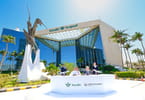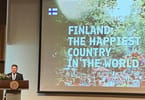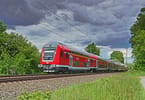ICCA, the international organization that is a reference for the market, has just declared the “world’s number one city for hosting international congresses.”
The decision was Paris. A distinction that testifies once again to the appeal of Paris and the quality of its expertise in hosting major events.
The International Congress and Convention Association (ICCA), the international organization that is a reference for the market, has just declared Paris – for the second consecutive year – the “world’s leading city for hosting international congresses”. The rankings are based on congresses that take place at regular intervals, attracting at least 50 participants and rotating in three countries. With 214 international congresses accounted for by the association, Paris outstrips Vienna (202) and Madrid (200).
‘It is a strong indicator of the appeal of Paris and recognition of the quality of our expertise in hosting major events. As the city with the most dynamic economy in the Euro zone, Paris is seen by professionals worldwide as a hub for business tourism’, acclaims Jean-François Martins, deputy mayor in charge of tourism.
These rankings come in addition to the survey published by the Paris Convention and Visitors Bureau on « Congress activity in Paris in 2014 ». It numbers 978 congresses held in Paris last year, which represents a rise of 1.2% compared to 2013. The number of participants also showed a sharp increase, with 688,690 people (+3.4%), i.e. an average of 704 people per event (compared to 689 in 2013). The congress sector alone now accounts for 9% of business overnights in Paris.
1.1 billion euros in economic benefits
Laying aside the criteria of the ICCA, Paris hosted 252 international congresses in 2014, up 7.7% compared to 2013. The share of international congress attendees (33%) thus saw an increase of 2 percentage points out of the total number of participants. « These congresses, for which Paris is a choice destination, are therefore of strategic importance. Their public spend an average of €344 per day, compared to €212 for national congresses. They alone generate 64% of the economic benefits of a congress’, underlines Nicolas Lefebvre, Managing Director of the PCVB.
In total, the economic benefits from the sector for Paris’s economy are estimated at 1.1 billion euros (+ 2.6% compared to 2013), of which 23% is direct spending – linked to the organization of a congress – and 77% is indirect spending (accommodation, restaurants/catering, leisure and entertainment, shopping, etc).
Medical congresses are still the most numerous
The five main subject areas – medical science, technology, sciences, economy and social sciences – accounted for 69% of congresses in 2014, and 81.2% of congress attendees. The most represented subject area was medical with 365 congresses (37% of total congresses): they accounted for 53% of the overall economic benefits.
Scientific places were favoured venues (35% of congresses), followed by congress centres (23%), meeting rooms (17%) and hotels with conference rooms (14%). Due to their large size, congress centres were the places that hosted the most congress attendees (65% of the total number).
Main characteristics of the congress activity
In 2014, 978 congresses were recorded by the Paris Convention and Visitors Bureau, which are 12 more than the previous year. In 2014, 51 new associations chose Paris to hold their first congress (17 in 2013). This constant rise over the years underlines the dynamism and appeal of Paris for this sector.
A rise in the number of congress attendees and a rise in the number of international congresses
The number of attendees at congresses in Paris rose by 1.2% in 2014 compared to 2013 totaling 688,690 participants. Furthermore, the average number of delegates at congresses was 704 in 2014 compared to 689 in 2013.
At the same time, the number of international rotating congresses rose from 234 to 252 between 2013 and 2014 (i.e. a share of 28% in 2013 compared to 33% in 2014).
Main characteristics of Parisian congresses in 2014
• Large majority of congresses (75%) that take place annually
• They are mainly held in June, October and November
• 61% of congresses were ‘sedentary’, i.e. those that always take place in Paris
• They last on average 2 days (2.3 days in 2013)
• 44% of congress had an international dimension (with at least 20% of foreign participants)
• 37% of congresses were linked to the medical sector, which gathered 61% of the attendees
• Scientific venues hosted 35% of congresses and convention centres hosted 23% of
congresses but convention centres hosted more delegates (65% of the total)
• 65% of congresses with less than 500 delegates (553 congresses) and 8% with more than 2000 (71 congresses)
oreign participants contributed largely to the economic spin-offs of congresses
1.107 billion euros of direct and indirect spin-offs from the congress sector were estimated for 2014, an increase of 2.6% compared to 2013. Expenditure linked to the organization of congresses account for 260 millions of euros (23%) whilst those linked to the stay of congresses attendees (accommodation, transport, restaurants, shopping, etc.) account for 848 millions of euros (77%).
In 2014, congresses generated the equivalent of 18,794 full-time jobs.
Foreign participants contributed mostly since they generated 64% of the spin-offs. As a matter of fact, French attendees spend on average 212 euros per day of congress whereas foreign delegates spend on average 344 euros.
Foreign participants represented 33% of the delegates in 2014.
Congresses held in Paris were predominantly those with a medical theme (37%). In addition to this sector, the top of the classification is dominated by congresses with technological (11%), science (10%) economic (6%) and social sciences (5%).
Medical congresses were those which attracted the greatest number of participants. Even if the most of them have a national dimension, they generate 53% of the economic contribution.






















